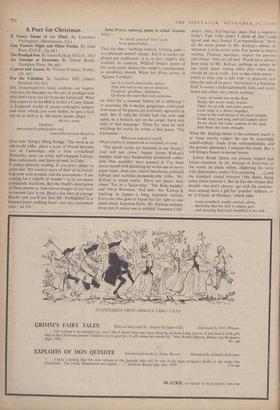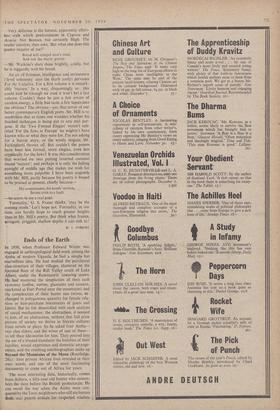A Poet for Christmas
For the Unfallen. By Geoffrey Hill. (Andre Deutsch, Its. 6d.)
MR. FERLINGHETITS book confirms my impres- sion that the beatniks are the sort of prodigal sons who don't stray too far from the fatted calf. What you expect to be his Hell is in fact a Coney Island, 'a kissproof world of plastic toiletseats tampax and taxis' which, you soon realise, he gets a kick out of as well as at. He howls louder about
the way some
librarians and cultural ambassadors and especially museum directors act
than over 'hungry Hong Kongs.' The -verse is an old-world trifle: -place a layer of Pound between two of Cummings, add a little crystallised Humanity, pour on some well-whipped Culture, Beat judiciously, and leave to soak in Coke. . . . It makes pleasant reading, if you don't object to jokes like 'My country tears of thee' or to swivel- ling your eyes around; and the excitement-1 am waiting for a rebirth of wonder'—is,by no means Completely factitious. But the blurb's description of these poems as 'true mirror-images of our era's tormented face' is rot. Read a few lines of average Brecht and you'll see that Mr. Ferlinghetti is a licensed jester, making faces—not very tormented ones—on TV.
John -Press's opening poem is called ..Insensi.: bility':
To shield yourself from pain Is no great ,trouble. . . .
That the idea—'nothing venture, nothing gain'— is a platitude doesn't matter. But it is neither ex- plored nor confirmed: it is, in fact, slightly dis- credited. In contrast, Wilfred Owen's poem of the same name shakes the reader's complacency, as sensibility should. When Mr. Press writes, in 'Against Comfort,' Say it is God's inscrutable decree That will not tet me sip an anodyne, Diagnose glandular deficiency, Or blame the stars that 1 am saturnine.
we don't for a moment believe he is suffering— or saturnine. He is decent, gregarious, cultivated. And most of his poems are extremely agreeable to read. But if only .-he. would lash out now and again, be a bastard, spit on the carpet, burst into tears or bad language! When for once he isn't watching his words he writes a fine poem. 'The Unwanted'—. •
What can redeem a world Where cruelty is slopped out as carelessly as.soup....
'The dumb words are fastened in my throat./ And will not come,' begins James Kirkup's bumper (and very -handsomely produced) collec- tion.. One :wouldn't have guessed it. I've been taxed myself with knocking up verses out of news- paper items, dead cats, tourist brochures, political killings and suchlike .inconsiderable trifles. Mr. Kirkup is. much worse. There are pieces here about 'Tea in a Space-ship,' The Body-builder' and 'All-in Wrestlers.' And then—Mr. Kirkup is teaching in Japan—a long Japanese section. Everyone who goes to Japan has the right to one poem about Japanese Dolls. Mr. Kirkup includes three (no, I notice one is entitled 'Japanese Chil- Oren). Also, 'Earthquake,. Imes :For a Japariec Lady's Fan' (why didn't I, _think of that!) and (good and very funny) 'Correspondences.' Well, all the more power to Mr Kirkup's elbow, or whatever it is he writes with. For power is what's missing. Fluency, alertness. respect for persons and things—they are all here Words have always been kind to Mr. Kirkup; perhaps in return he has spoilt them. letting them play when they should be out at work. And so the whole poem-- which is what one is left with—is generally less than the sum of its parts. 'Invitation to a Japanese Doll' is surely a little (admittedly little. and nicely done) ado,about very nearly nothing :
Come, sit beside me on the floor Beside the warm stone brazier.
There let us talk and make poems,
Look long at a flower together,
Listen to the cool sweep of the snow outside, Drink wine, and sing, and fall happily silent As we share the same cushion in the dusk, And think the same thought.
What Mr. Kirkup thinks is the common touch is at times merely vulgar; he can be amazingly unself-critical. Aside from sentimentalities and the grosser platitudes, 1 enjoyed this book. But it will bring a frown to sterner brows.
Edwin Brock claims our present respect and future attention. In An Attempt at Exorcism, at the worst, he plods rather, cluttering his verse with deprecatory asides ('1'm assuming . . .'.) and the standard casual humour ('the ducks being noisy about summer'). But he has the virtues that shouldbut don't always—go with his cautious- ness, among them a gift for 'popular' subjects, as in 'A Clutter of Mothers,' which ends
many-mouthed, loudly critical, alone, • declaring that the best is always past and swearing that each mouthful is my last.
Very different is the formal, apparently effort- less style which predominates in Cypress and Acacia. Not Roman, but certainly High. The reader admires, then asks, 'But what else does this poetry require of me?'
Bread will compel man's trust, And not the starry groves
—Mr. Watkins's stars shine brightly, coldly, but he is niggardly with his bread.
An air of firmness, intelligence and seriousness ('level solemnity' says the blurb justly) pervades For the Unfallen. For a first volume it is remark- ably 'mature.' In a way, disquietingly so: this could well be (though we trust it won't be) a last volume. Couldn't there be just a few errors of careless energy, a little bad taste, a few lapses.into the obvious? The obvious—yes, that terror of our better contemporary English poets. Mr. Hill is so unobvious that at times one wonders whether his finished technique is being put to any real pur- pose. If the 'Two Formal Elegies' weren't sub- titled 'For the Jews in Europe' we mightn't have known who or what they were for. I'm not asking for a horror story, or the windy slogans Mr. Ferlinghetti throws off. But couldn't the poems have been less formal, more elegiac, even less cryptically for the Jews? It was this consideration that worried me into putting inverted commas round `mature'; and perhaps it is only the failing eyesight of middle age that makes me wish for something more palpable. 1 have been ungentle with Mr. Hill, partly because his poetry is bound to be praised at present, chiefly because— His countenance, his hands' motion,
Serene even to a fault
—he seems to me a real poet.
'Formality,' G. S. Fraser thinks, 'may be the coming mode.' Let's hope not. Formality, in our time, can hardly hope to reach greater heights than in Mr. Hill's poetry. But think what frozen, arrogant, priggish, shallow depths it can sink to !
D. J. ENRIGH1







































































 Previous page
Previous page